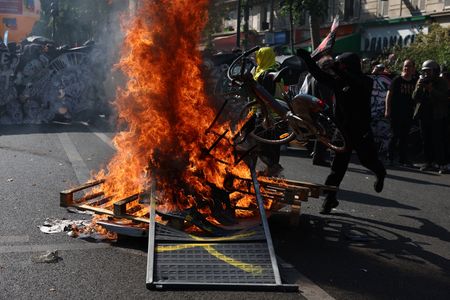By Sarah Meyssonnier and Layli Foroudi
PARIS (Reuters) -French anti-pension reform protesters stormed the headquarters of the Paris 2024 Olympic Games on Tuesday as trade unions made a last-gasp attempt to pressure lawmakers into reversing President Emmanuel Macron’s raising of the retirement age.
BFM TV broadcast images of several dozen hard-left CGT trade union militants briefly occupying the building in Aubervilliers in northern Paris.
“There was no violence and no damage,” a Games spokesperson told Reuters.
The latest nationwide protests attracted far fewer people compared to the last demonstration on May 1.
The French government said a total of 281,000 people took to the streets across France on Tuesday, well below the figure of 782,000 for the prior protests on May 1.
Trade unions have fought Macron’s move to make the French work longer since mid-January, with rolling strikes and protests that have at times descended into violence on the fringes.
However, the level of violence at the demonstrations has gradually abated, after major clashes broke out in March and April, although some minor vandalism occurred at the end of Tuesday’s protest in Paris.
Macron says it was necessary to lift the legal retirement age by two years to 64 to plug a widening pension deficit. However, trade unions say the money can be found in other ways, such as raising taxes on the wealthy.
The new pension law is already on the statute books and after months of rare unity among the biggest trade unions, there are now divisions over where to focus energies.
Sophie Binet, the secretary-general of the CGT, said her union would fight on.
“There’s a lot of anger but also fatigue,” Binet said, adding that strikers had felt their wallets pinched.
‘BALANCE OF POWER’
Between 400,000 and 600,000 people were expected to join the protests, authorities said, which would be down from more than a million who took part at the height of the pension protests earlier this year.
Some protesters have threatened to disrupt next summer’s Olympics if Macron does not back down. Banners reading “No retirement, No Olympics” were visible in Paris.
Some 11,000 police were deployed, including 4,000 in Paris, on Tuesday. Fuel deliveries were blocked from leaving TotalEnergies’ Donges site, near Nantes in western France where riot police clashed with black-clad protesters.
Disruption to rail travel was light. The civil aviation authority asked airlines to cancel a third of the flights out of Paris-Orly, the capital’s number two airport, and a walkout by some air traffic control staff forced some overflight cancellations.
“Again today we’ve had to cancel some 400 flights … because of French ATC strikes. The majority of these flights are overflights and not going to France,” Ryanair CEO Michael O’Leary tweeted.
Macron and his government have been on a blitz in past weeks to shift the narrative. The French leader has unveiled electric vehicle battery investments, tax credits for green industry and middle-class tax cuts.
Lauren Berger, head of the reform-minded CFDT trade union, said the aim was now to turn anger into a “show of strength” in talks with the government on issues such as improving work conditions and purchasing power.
On Thursday, an opposition-sponsored motion aimed at cancelling the minimum pension age increase will be reviewed by the French parliament.
It is expected to be rejected by the lower house’s speaker, a member of Macron’s party, because under the constitution, lawmakers cannot pass legislation that weighs on public finances without measures to offset those costs.
But unions hope a big protest turnout could pressure lawmakers into holding a vote and set the stage for further challenges.
“We need to prepare for what’s to come (after the summer),” said Jean-Luc Carbonari, a 60-year-old sewer works engineer. “We need to reverse the political balance of power.”
(Reporting by Michel Rose, Sarah Meyssonier, Dominique Vidalon and Forrest Crellin; Additional reporting by Sudip Kar-GuptaWriting by Michel Rose and Richard Lough; Editing by Hugh Lawson, Sharon Singleton, Nick Macfie and Paul Simao)





